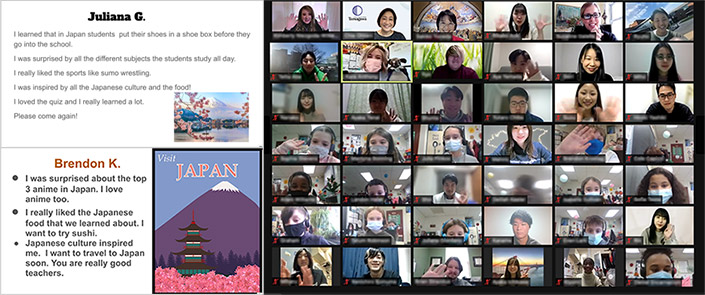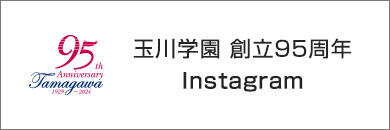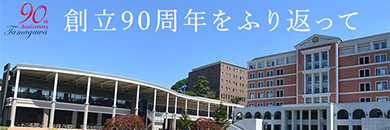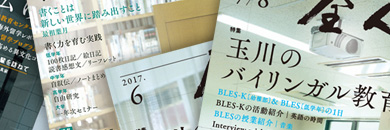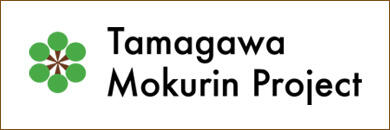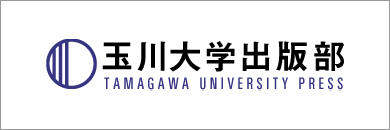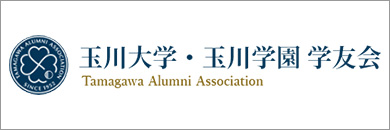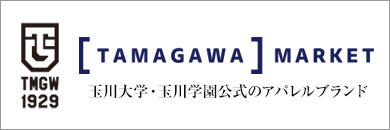Practicum-Based COIL (Collaborative Online International Learning) between Tamagawa University & Wilkes University
Wilkes University Class + Visit Local Elementary SchoolJapan time: November 5th, 21:30-22:30 (PA time 8:30-9:30)
The Center for International University Programs at Tamagawa University provides meaningful global learning known as TAMAGO (Tamagawa Global Opportunities). A practicum-based COIL (Collaborative Online International Learning) between Wilkes University and Tamagawa University has enabled Tamagawa students to observe and teach American children at an elementary school in Pennsylvania. Twenty-six students (Department of English Education), who are taking Dr. Sakiko Yonedaʼs “Teaching English at Elementary Schools” and aiming to become English teachers, participated in this COIL as part of the curriculum.
The major goal was for Tamagawa students to teach 5th-grade children at Wyoming Area School District (Pennsylvania, USA) online in December. Dr. Suzanne Murray Galella and Dr. Kimberly Niezgoda gave an overview of Wilkes University’s curriculum and the Wyoming Area School District. Then, the students participated in Ms. Kara Anthony's class. Ms. Anthony is a master teacher (role model for local teachers) in her District. The teaching materials were fun and grabbed children’s attention, and included Ms. Anthonyʼs avatar. As the Pandemic comes to an end, it is important to remember that Teachers need the same skills, both face-to-face and online, such as providing interesting introductions, engaging children (Galileo the Rat, is a puppet who serves as Ms. Anthonly’s class mascot, often speaks to the children during the lesson), asking questions, and talking to children. Schools and universities in the United States have already returned to face-to-face lessons, so on the day of the experience, the children of Wyoming Area School District participated from their classroom using tablets. Ms. Anthony’s objectives for the lesson were:
- Play a pirate themed escape room, reviewing inferencing homophones, and cause & effect skills.
- Write a fiction creative writing piece.
A map of pirates and Ms. Anthony’s avatar, dressed as a pirate appeared, leading children to a fun and exciting world of learning. Tamagawa students, reflected on what they learned while observing Ms. Anthony’s class, and then prepared for a teaching experience on December 5th (See the report below).
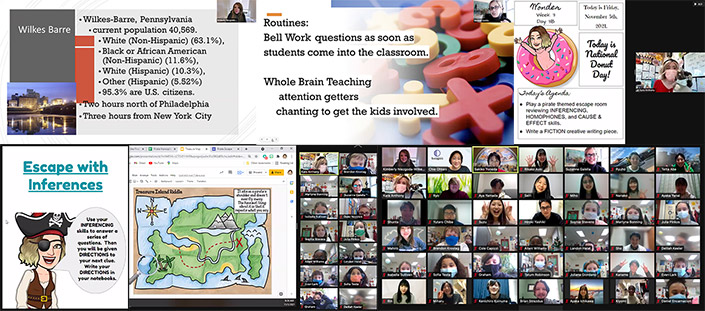
Wilkes University Class + Teaching at a Local Elementary SchoolJapan time: December 3rd, 21:30-22:30 (PA time 8:30-9:30)
Students from the Department of English Education at Tamagawa University, who attended the November 5th session, introduced Japan to the 5th-grade children from Wyoming Area School District (Pennsylvania, USA). Due to the time difference, Dr. Suzanne Murray Galella and Dr. Kimberly Niezgoda of Wilkes University presented additional information on Wyoming Area School rules and children until the opening hours of the Wyoming Area School.
This time as well, Dr. Sakiko Yoneda of the Department of English Education carefully prepared the Tamagawa students to teach the American children all about Japanese schools. The children were captivated by the information taught by Tamagawa students, and so excited to learn about Japanese K-12 education.
The 26 Tamagawa students took turns teaching about the topics they prepared using a quiz format. It was observed through their reactions on the screen, that the 5th-grade children were thrilled to be learning about Japan. Since we used Google Meet, some children switched to Google’s AI translation and wrote comments in Japanese. The digitally native Children impressed us with their flexibility.
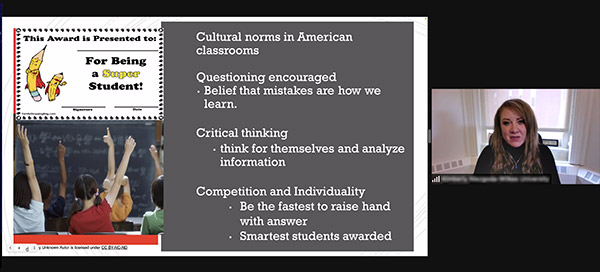
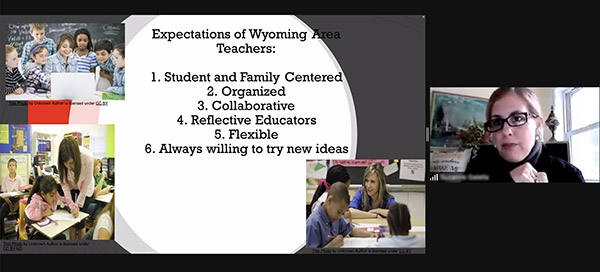
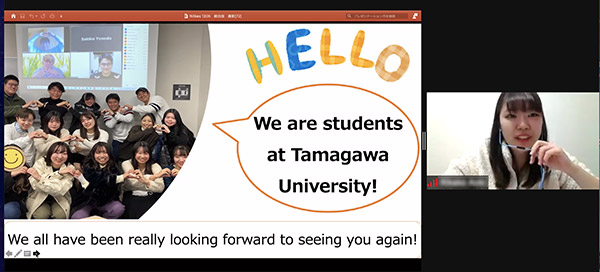
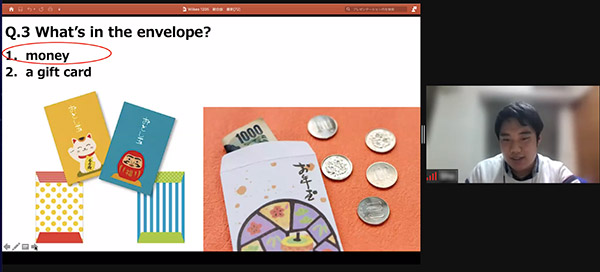
After this lesson, each Tamagawa student prepared their own thank-you notes to Ms. Anthony and the children they taught. It is important to express gratitude and thanks when participating in an international experience. Through this COIL, the Tamagawa students also learned how to express respect and humility as learners (Collaborative Online International Learning).
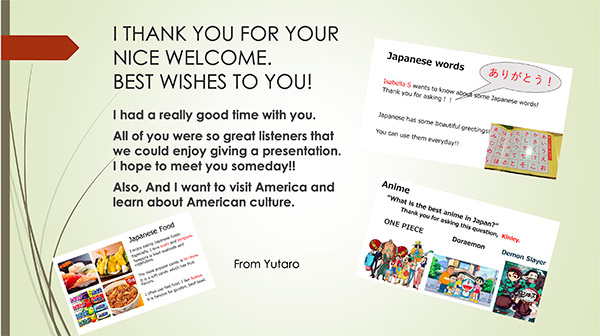
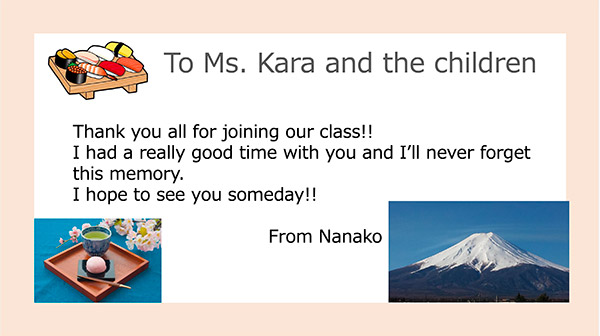
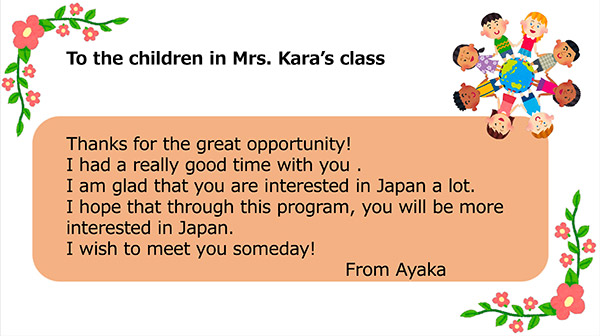
The students also recognized the importance of positive feedback which was simply shown by the teacher’s smile. They were inspired by the children’s willingness to try new things, and discovered that over time, they too will develop a sense of accomplishment and confidence. The time difference was a big challenge, but the students felt the COIL significant enough to want to participate in spite of the late hour in Japan. The Senior students were such good role models of how to teach, that the Junior students were inspired to set their own goals for when they reach this level. The students’ comments reflect their learning and growth as future teachers shown in their reflections on the experience:
- Kara-sensei always praised the childrenʼs answers and thoughts. I learned the importance of positive feedback in my practicum, and I recognized it. It was impressive that Kara-sensei praised the children with concrete words and a smiling face. (Senior, Dept. of English Language Education)
- The childrens’ reactions and attitudes were the most impressive ones. Although it was on Zoom, the childrens’ facial expressions gradually changed, nodding and smiling when we started our lesson because they were interested in Japan. They participated in the class with excitement.(Senior, Dept. of English Language Education)
- I was impressed by the senior students this time, and I strongly feel anxiety and a sense of mission for next year. I am also worried if I can impress junior students like this year. Since this yearʼs activity was unforgettable, I would like to work hard and do my best as my own goal.(Junior, Dept. of English Language Education)
Also, the children at Wyoming Area School sent thank-you notes. We received wonderful feedback, including that one child was so happy he talked to his mom about the experience immediately after returning home. The children wanted to learn a lot in class, go to Japan, and so on. This positive feedback on the COIL demonstrates it was also meaningful for the 5th grade children
